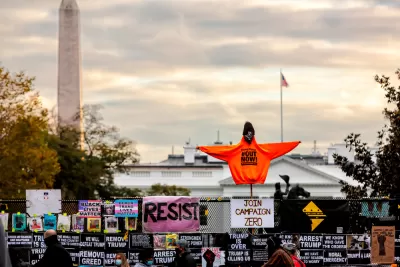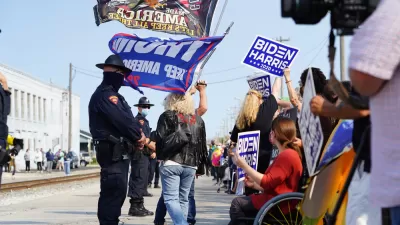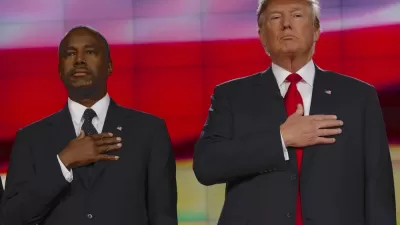The Biden and Trump campaigns are from different worlds on housing policy, according to this analysis.

"Whether voters choose a Trump administration or a Biden administration, the next president of the United States could face a daunting 30 to 40 million households at risk for evictions," writes Sadef Ali Kully, citing data from August.
Despite the risks, the presidential campaign of has been defined by a lack of substantive discussion of the looming housing crisis, but the track record and platforms of the candidates reveal more about what might be expected in the case of either winning the election.
In describing Trump's housing policy platform, Kully notes that a presidential career spent weakening fair housing laws in the United States was preceded by a previous career as a developer accused of fair housing violations.
In addition to its actions on fair housing, the Trump administration also introduced a housing finance reform plan in 2016 that "seeks to restructure and release Fannie Mae and Freddie Mac from federal government conservatorship, which occurred after the 2008 Great Recession," according to Kully.
Among Trump's other related accomplishments, Kullu lists the Opportunity Zones program, which offers tax incentives for investments in designated low-income areas. That program has been dogged by controversy throughout its relatively short existence.
As for Biden, Kully notes the former vice president's time in the U.S. Senate, when he wrote 11 pieces of legislation related to housing and development. Unlike the Trump campaign, the Biden campaign released an official housing plan, focusing on four main goals for housing: "Ending redlining and other discriminatory practices in the housing market, providing financial assistance for tenants and first time homeowners, increasing the housing supply and lowering the costs of quality housing and lastly, a comprehensive plan which will work towards ending homelessness."
Kully provides more details on Biden's housing platform heading into the election:
Biden also supports the Legal Assistance to Prevent Evictions Act of 2020, which will help tenants facing eviction gain access to legal assistance, similar to New York City’s Right to Counsel program. He plans on enacting legislation to prevent exclusionary zoning by requiring any state receiving federal dollars through the Community Development Block Grants or Surface Transportation Block Grants, paired with an investment of $300 million in Local Housing Policy Grants to give local governments technical assistance and planning support.
The list goes on, Biden's housing policy showing as far more robust than Trump's—an angle that should be apparent from the headline of the source article: the two campaigns are on different worlds of housing policy.
FULL STORY: Trump and Biden are in Different Worlds on Housing

Maui's Vacation Rental Debate Turns Ugly
Verbal attacks, misinformation campaigns and fistfights plague a high-stakes debate to convert thousands of vacation rentals into long-term housing.

Planetizen Federal Action Tracker
A weekly monitor of how Trump’s orders and actions are impacting planners and planning in America.

In Urban Planning, AI Prompting Could be the New Design Thinking
Creativity has long been key to great urban design. What if we see AI as our new creative partner?

King County Supportive Housing Program Offers Hope for Unhoused Residents
The county is taking a ‘Housing First’ approach that prioritizes getting people into housing, then offering wraparound supportive services.

Researchers Use AI to Get Clearer Picture of US Housing
Analysts are using artificial intelligence to supercharge their research by allowing them to comb through data faster. Though these AI tools can be error prone, they save time and housing researchers are optimistic about the future.

Making Shared Micromobility More Inclusive
Cities and shared mobility system operators can do more to include people with disabilities in planning and operations, per a new report.
Urban Design for Planners 1: Software Tools
This six-course series explores essential urban design concepts using open source software and equips planners with the tools they need to participate fully in the urban design process.
Planning for Universal Design
Learn the tools for implementing Universal Design in planning regulations.
planning NEXT
Appalachian Highlands Housing Partners
Gallatin County Department of Planning & Community Development
Mpact (founded as Rail~Volution)
City of Camden Redevelopment Agency
City of Astoria
City of Portland
City of Laramie





























